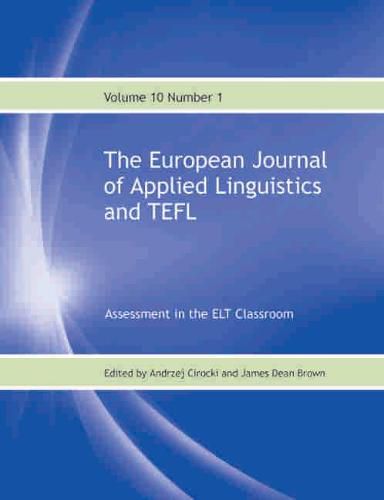Readings Newsletter
Become a Readings Member to make your shopping experience even easier.
Sign in or sign up for free!
You’re not far away from qualifying for FREE standard shipping within Australia
You’ve qualified for FREE standard shipping within Australia
The cart is loading…






This title is printed to order. This book may have been self-published. If so, we cannot guarantee the quality of the content. In the main most books will have gone through the editing process however some may not. We therefore suggest that you be aware of this before ordering this book. If in doubt check either the author or publisher’s details as we are unable to accept any returns unless they are faulty. Please contact us if you have any questions.
The European Journal of Applied Linguistics and TEFL is a refereed academic publication which aims to disseminate information, knowledge and expertise in the broad area of applied linguistics. Strong preference is given to contributions relating to second language acquisition, EFL pedagogy, teacher training and classroom innovation. This special issue is devoted to the theme of Assessment in the ELT Classroom and consists of ten articles presenting the latest theoretical deliberations, research and scholarship from Australia, the United Kingdom, South Korea, the United States, the United Arab Emirates, Hong Kong, Lithuania, Norway and Cyprus, and covers important topics in the field, including, but not limited to: Psychometric and edumetric approaches to classroom assessment - Valid and reliable scoring rubrics for performance-based assessment - Classroom assessment practices in an oral skills class - Assessing writing in MENA contexts - The use of e-portfolios in assessing EFL writing - The impact of cert-mania on English language learning and teaching. This provides a valuable source of reference for applied linguists, teacher educators, materials developers and practitioners in the field of TESOL. The content also offers readers a deeper insight into current issues and practices, thereby broadening their knowledge and promoting professional development.
$9.00 standard shipping within Australia
FREE standard shipping within Australia for orders over $100.00
Express & International shipping calculated at checkout
This title is printed to order. This book may have been self-published. If so, we cannot guarantee the quality of the content. In the main most books will have gone through the editing process however some may not. We therefore suggest that you be aware of this before ordering this book. If in doubt check either the author or publisher’s details as we are unable to accept any returns unless they are faulty. Please contact us if you have any questions.
The European Journal of Applied Linguistics and TEFL is a refereed academic publication which aims to disseminate information, knowledge and expertise in the broad area of applied linguistics. Strong preference is given to contributions relating to second language acquisition, EFL pedagogy, teacher training and classroom innovation. This special issue is devoted to the theme of Assessment in the ELT Classroom and consists of ten articles presenting the latest theoretical deliberations, research and scholarship from Australia, the United Kingdom, South Korea, the United States, the United Arab Emirates, Hong Kong, Lithuania, Norway and Cyprus, and covers important topics in the field, including, but not limited to: Psychometric and edumetric approaches to classroom assessment - Valid and reliable scoring rubrics for performance-based assessment - Classroom assessment practices in an oral skills class - Assessing writing in MENA contexts - The use of e-portfolios in assessing EFL writing - The impact of cert-mania on English language learning and teaching. This provides a valuable source of reference for applied linguists, teacher educators, materials developers and practitioners in the field of TESOL. The content also offers readers a deeper insight into current issues and practices, thereby broadening their knowledge and promoting professional development.